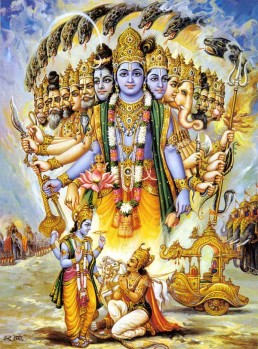Commentary
Arjuna was extremely terrified on seeing the Cosmic Form and so he spoke in a choked and stammering voice. These words of Sanjaya are very significant because he thought that at this late moment (after knowing fully well the impending destruction of all in the Kaurava side) King Dhritarashtra would halt the war and call for peace to save at least his own son from being killed. But the blind king was obstinate and did not consider Sanjaya’s indirect advice worthy.
ARJUNA’S HYMN OF PRAISE
Swami Chinmayananda
Swami Chinmayananda Commentary
The commentary on this verse and the rest, is avaialble for free as:
Kindle eBook
Google Play Book
Apple Books
Adi Sankara Commentary
Srutva, hearing; etat, this, aforesaid; vacanam, utterance; kesavasya, of Kesava; Kiriti, krtanjalih, with joined palms; and vepamanah, trembling; nama-skrtva, prostrating himself; aha, said; bhuyah eva, again; Krishnam, to Krishna; sa- gadgadam, with a faltering voice-. A person’s throat becomes choked with phlegm and his eyes full of tears when, on being struck with fear, he is overcome by sorrow, and when, on being overwhelmed with affection, he is filled with joy. The indistinctness and feebleness of sound in speech that follows as a result is what is called faltering (gadgada). A speech that is accompanied with (saha) this is sa-gadgadam. It is used adverbially to the act of utterance. Pranamya, bowing down with humility; bhita-bhitah, overcome by fits of fear, with his mind struck again and again with fear-this is to be connected with the remote word aha (said). At this juncture the words of Sanjaya have a purpose in view. How? It is thus: Thinking that the helpless Duryodhana will be as good as dead when the four unconquerable ones, viz Drona and others, are killed, Dhrtarastra, losing hope of victory, would conclude a treaty. From that will follow peace on either side. Under the influence of fate, Dhrtarastra did not even listen to that!
The Bhagavad Gita with the commentary of Sri Sankaracharya – Translated by Alladi Mahadeva Sastry
Holy Geeta – Commentary by Swami Chinmayananda
The Bhagavad Gita by Eknath Easwaran – Best selling translation of the Bhagavad Gita
The Bhagavad Gita – Translation and Commentary by Swami Sivananda
Bhagavad Gita – Translation and Commentary by Bhaktivedanta Swami Prabupadha
Srimad Bhagavad Gita Chapter 11 – Verse 35 – 11.35 etacchrutva vacanam – All Bhagavad Gita (Geeta) Verses in Sanskrit, English, Transliteration, Word Meaning, Translation, Audio, Shankara Bhashya, Adi Sankaracharya Commentary and Links to Videos by Swami Chinmayananda and others – 11-35

